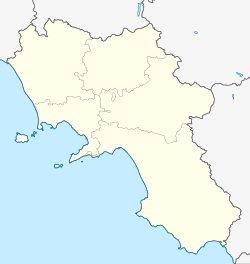Gioi is a town and comune in the province of Salerno in the Campania region of south-western Italy. As of 2011, its population was 1,339.[2]
Gioi | |
|---|---|
| Comune di Gioi | |
 South view | |
 Gioi within the Province of Salerno | |
| Coordinates: 40°17′21.84″N 15°13′3.07″E / 40.2894000°N 15.2175194°E | |
| Country | Italy |
| Region | Campania |
| Province | Salerno (SA) |
| Frazioni | Cardile |
| Area | |
• Total | 28 km2 (11 sq mi) |
| Elevation | 684 m (2,244 ft) |
| Population (31 December 2011)[2] | |
• Total | 1,339 |
| • Density | 48/km2 (120/sq mi) |
| Demonym | Gioiesi |
| Time zone | UTC+1 (CET) |
| • Summer (DST) | UTC+2 (CEST) |
| Postal code | 84056 |
| Dialing code | 0974 |
| ISTAT code | 065057 |
| Patron saint | St. Nicholas, Our Lady of the Rosary |
| Saint day | 19 August |
| Website | Official website |
History
editThe comune of Gioi has a history that dates back well over 1000 years. The first permanent inhabitants may have been monks who settled there around the 11th century. The village was fortified in the 15th century, and parts of the fortifications still exist. The population peaked at about 18,000 in the mid 16th century[citation needed] before being decimated by a plague in 1556. A second plague occurred in 1645, after which the prosperity of the village went into long-term decline.[3]
Geography
editLocated in the middle of Cilento, Gioi borders with the municipalities of Campora, Moio della Civitella, Orria, Salento, Stio and Vallo della Lucania. It counts a single hamlet (frazione), that is the village of Cardile, 6 km far from it.
Main sights
edit- Churches
- Church of Sant'Eustachio
- Church of San Nicola
- Church of San Francesco
- Chapel of Madonna della Porta
- Chapel of Madonna dello Schito
- Chapel of Madonna della Grazie
- Palaces
- Palace Conti
- Palace Ferri
- Palace Reielli
- Palace Salati
Demographics
edit
Notable people
edit- Leo de Berardinis (1940-2008), stage actor and theatre director
- Armando Salati (1884-1963), Vice Consul to the United States
- Giuseppe Salati (1847-1930), author of L'Antica Gioi[4]
Genealogy project
editThe Genetic Park of Cilento and Vallo di Diano Project was established in 2000, and focuses on the populations of Campora, Gioi, and Cardile. Using village and church records, a pedigree of over 5000 individuals was created that spans 350 years.[5]
See also
editReferences
edit- ^ "Superficie di Comuni Province e Regioni italiane al 9 ottobre 2011". Italian National Institute of Statistics. Retrieved 16 March 2019.
- ^ a b Source: Istat 2011
- ^ Giuseppe Salati, L'Antica Gioi, 1911
- ^ Giuseppe Salati, L'Antica Gioi - Historical information, 1911, published by "La Meridionale", Bari, Italy
- ^ "Genetic Park of Cilento and Vallo di Diano Project". Archived from the original on 2013-07-22. Retrieved 2013-04-30.


